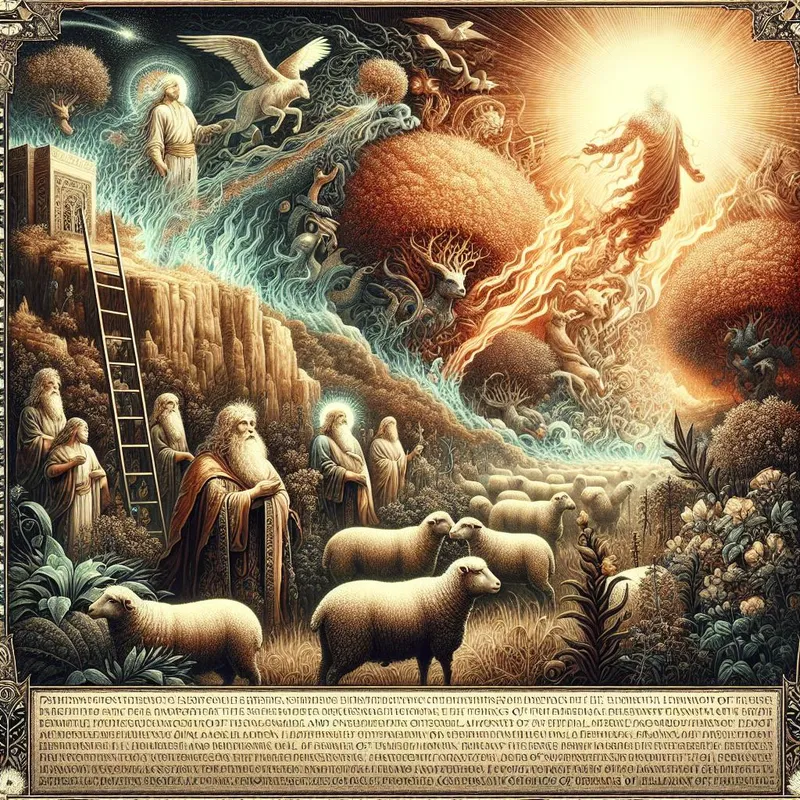
'Unlocking the Divine Promise: God of Abraham, Isaac & Jacob Revealed'
Posted on 16 July 2024
God of Abraham, Isaac, and Jacob
The Bible refers to the Lord God as the God of Abraham, Isaac, and Jacob in several places. This name emphasizes the covenant that God made with Israel and their special place as God's chosen people. The Abrahamic Covenant was repeated to three different generations: Abraham, Isaac, and Jacob. All three were given the promise of land, many descendants, and blessing.
The Covenant with Abraham
The Lord called Abram out of Ur of the Chaldees to the land of Canaan and established a covenant with him (Genesis 12:1–3). This covenant included promises of land, descendants as numerous as the stars, and blessing for all nations through his descendants. God reaffirmed this covenant with Abraham's son, Isaac (Genesis 21:12; 26:3–4), and later with Isaac's son, Jacob (Genesis 28:14–15).
The God of Abraham, Isaac, and Jacob
When God revealed Himself to Moses in preparation for bringing His people out of Egypt, He identified Himself as "the God of Abraham, Isaac, and Jacob" in Exodus 3:15. This name carries important implications. First, it distinguishes the Lord from the gods of Egypt, highlighting that He is the one true God. Second, it reminds the Israelites of the promise of land given to their forefathers. The faithfulness of God and the blessings upon Israel were directly tied to their possession of the Promised Land.
The Resurrection and the God of the Living
Jesus alluded to God's appearance to Moses at the burning bush when He taught about the resurrection to the Sadducees. He said, "I am the God of Abraham, the God of Isaac, and the God of Jacob" (Matthew 22:31–32). Jesus pointed out that these patriarchs were still alive in heaven, as God's verb usage indicates that He is their present God. This teaching emphasizes the reality of the resurrection and the eternal life that believers will experience in God's presence.
The God of our Fathers
In Acts 3, Peter preaches to the Jews in the temple, referring to the God of Abraham, Isaac, and Jacob. He attributes the miracle of a lame man walking to the power of this God working through Jesus. Peter emphasizes that this same God who spoke to the patriarchs is at work in their midst. However, he also highlights a contrast—the Jews handed Jesus over to be killed, despite His divine nature. Peter reminds his hearers that they are heirs of the prophets and of the covenant God made with their fathers, emphasizing the continuity between their faith and the promises given to Abraham, Isaac, and Jacob.
The Plan for Redemption
The God of Abraham, Isaac, and Jacob has a plan for the ages that involves a Savior who provides forgiveness of sins and reconciliation with God. This plan was set in motion when God called Abram and blessed him. It reached its fulfillment in Jesus' death and resurrection. Through the seed of Abraham, all nations are blessed by the God of Abraham, Isaac, and Jacob.
Why This Matters
Understanding God as the God of Abraham, Isaac, and Jacob helps us grasp His faithfulness to His promises. It reveals His plan for redemption throughout history and highlights the importance of Jesus as the fulfillment of that plan. Recognizing our connection to God's covenant with Israel deepens our appreciation for our own spiritual inheritance as believers.
Think About It
Consider how knowing that God is the God of Abraham, Isaac, and Jacob affects your understanding of His character and purposes. Reflect on how this knowledge strengthens your confidence in His faithfulness and love for His people.
